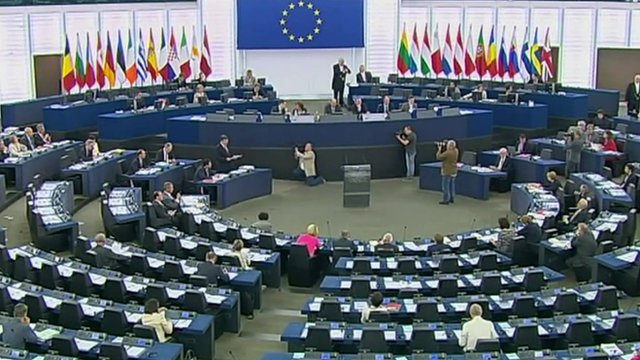The European Parliament agreed Wednesday to a new 7-year authorization until 2023 for the controversial herbicide glyphosate, against the 15-year re-authorization originally proposed by the European Commission. The Parliamentary GUE/NGL Group had advocated a total ban on the substance.

This European Parliament vote is non-binding on the European Commission and EU member states, but arguably carries moral weight. The EU member states will take the final vote in May.
GM Watch stated: “While this is not the ban that we and many groups wanted, the European Parliament asks for significant restrictions on glyphosate use”:
- No approval of non-professional use
- No approval in or close to public parks/playgrounds/gardens
- No approval where integrated pest management systems are sufficient for necessary weed control
- Strict limitations on pre-harvest applications (desiccation), which are deemed unacceptable
- The resolution further calls for:
- An independent review of overall toxicity of glyphosate;
- A call on the Commission and EFSA to immediately disclose all scientific evidence for the positive classification of glyphosate, given the overriding public interest in disclosure;
- A call on the Commission to test and monitor glyphosate residues in foods and drinks produced in the Union as well as in imported produce;
- Strong criticism of the Commission for accepting an incomplete dossier with regard to endocrine disruption;
- Strong criticism of the problem of resistances of weed created by glyphosate, and the toxic spiral by agro-biotech companies adding further resistances to plants.
Source: www.guengl.eu
Czech MEP Kateřina Konečná, GUE/NGL coordinator on the Parliament’s Committee on the Environment and Public Health, said: “I am really disappointed by the outcome of today’s vote on our objection to the re-authorization of the glyphosate herbicide. Our objection has been distorted. Some really bad amendments were tabled by right-wing groups in order to weaken a ban on glyphosate in the resolution and, unfortunately, they were approved.”
Nearly 700 MEPs voted on the 7-year licensing of glyphosate and the vote was passed by 374 votes in favor to 225 votes against.
The MEPs failed to recognize the warning signs sent by the World Health Organization last year when their cancer agency IARC announced that glyphosate was a “probable human carcinogen“.
The vote to re-register glyphosate was originally delayed following the Great Glyphosate Rebellion in March, in which many countries across the EU stated they would vote against a new license for the chemical.
Reuters reported last Friday that France’s health and safety agency (ANSES) decided to ban weedkillers that combine chemicals glyphosate and the adjuvant tallowamine due to uncertainty over possible health risks, the agency said on Friday.
THE GLYPHOSATE BOX
10 Things You Need to Know about Glyphosate
“Right-wing groups succeeded in passing their amendment calling on the Commission to renew the approval of glyphosate for another 7 years. Glyphosate is ‘carcinogenic’ to animals and ‘probably carcinogenic’ to humans and its authorization should not be renewed. This is an outrageous gamble with the health of European citizens by the Commission and right-wing groups. And it also goes against the wishes of two-thirds of EU citizens. Today it is big corporations like Monsanto that have won and the health of European citizens that has lost,” Konečná concluded.
Dutch GUE/NGL MEP Anja Hazekamp added; “It is disappointing that the European Parliament has put the importance of the profits of multinationals like Monsanto over our environment and the health of people and animals.”
“The widespread use and carcinogenic effects of glyphosate are a dangerous combination. This poison is found in rivers, ground water and in our food. Research shows that half of all people in Europe have glyphosate traces their bodies. 1.5 million people signed a petition against glyphosate and as many as two-thirds of all Europeans want a ban on the substance. Glyphosate is almost impossible to avoid and should be taken off the market now that the safety for humans and animals cannot be guaranteed,” MEP Hazekamp concluded.
Glyphosate is the most widely used herbicide in the world and one of Europe’s best sellers. The poison kills weeds in gardens and is widely used in agriculture.


















well what do they want to do to the human race never mind the animals we all know there are too many people in the world but this is not the way to control it. I wont stand fore these big corporations to make big money by KILLING MY FAMILY FRIENDS.What is wrong with those who are able to control are THEY THE MONEY MAKERS dont they realise this will KILL them too.Another reason why we in the UK should leave the EU let them kill them selves NOT US
WE shall not have any Animals left in this world…………..
MAY THEY DONT WANT THIS WORLD ANY MORE
Robust opposition forced the EU to limit the extension to 1.5 year only pending further research on glyphosate.
www.reuters.com/article/us-health-eu-glyphosate-idUSKCN0ZE25B